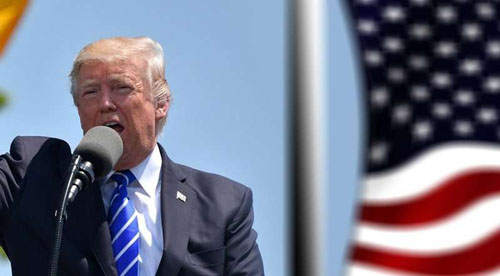by WorldTribune Staff, May 21, 2019
A new study has found that anti-black and anti-Hispanic prejudice has declined since President Donald Trump took office. The results defied their expectations, the researchers said.
In the study, University of Pennsylvania sociologists Daniel J. Hopkins and Samantha Washington set out to measure the effect of Trump’s election on anti-black and anti-Hispanic prejudice. For the study, they used a randomly-selected panel of 2,500 Americans whose changing opinions have been under study since 2008.

The Penn academics reported that they had been expecting to measure a rise in racist opinions in the Trump era, writing: “The normalization of prejudice or opinion leadership both lead us to expect that expressed prejudice may have increased in this period, especially among Republicans or Trump supporters.”
Hopkins and Washington said they had been led to expect this after an extensive reading of recent literature in social sciences which, they say, supports the notion that racist attitudes lie dormant inside many people, waiting to be triggered by certain events – of which the election of Donald Trump might be one.
The study found the opposite.
Americans, Hopkins and Washington said, have actually become less inclined to express racist opinions since Trump was elected. Anti-black prejudice, they found, declined by a statistically-insignificant degree between 2012 and 2016 while President Barack Obama was in office. After Trump was elected in 2016, the study found, anti-black prejudice took a sharp dive that was statistically significant. Moreover, contrary to their expectations, the decline was as evident among Republican voters as it was among Democrats. There was also a general fall in anti-Hispanic prejudice, the study found.
The study runs contrary to what corporate media have been reporting since Trump’s election, Ross Clark noted in a May 16 op-ed for Spectator USA.
“The election of Donald Trump has, of course, unleashed the latent racist which lurks within millions of Americans,” Clark wrote. “We know this because enlightened opinion keeps telling us so. The New Yorker, for example, ran a piece in November 2016 declaring ‘Hate on rise since Trump’s election’, and quoting a list of incidents collected by the Southern Poverty Law Center – including the experience of a girl in Colorado who was allegedly told by a white man: ‘Now that Trump is president I am going to shoot you and all the blacks I can find’. TIME magazine, too, ran a story in the same month announcing ‘Racist incidents are up since Donald Trump’s election’. In March 2017 the Nation asserted ‘Donald Trump’s rise has coincided with an explosion in hate groups’, claiming that 100 racist organizations had been founded since Trump began his presidential campaign.”
Just as with Britain’s vote for Brexit, “Trump’s strident language and his concentration on issues such as migration is supposed to have coarsened political discourse – legitimizing racist and xenophobic opinions in people who might otherwise have been shamed into silence,” Clark wrote. “By this narrative, even slightly immoderate speeches, posters and campaigns by politicians become magnified through the lens of public opinion into something much more sinister.”
But, as attempts by foes of Brexit to tie the vote with rising xenophobia have been debunked, the Penn study does the same for media proclamations of racism on the rise on Trump’s watch.
“It might be added,” Clark wrote, “that the election of Barack Obama also caught liberal opinion unawares. That event, it might be recalled, was supposed to be the breakthrough which led to a kinder, gentler America. Instead it seemed to be followed by a more fractious period in race relations, culminating in race riots in Ferguson, Missouri, in 2014.”
Your Intel Brief: Geostrategy-Direct __________ Fix The Media Now
